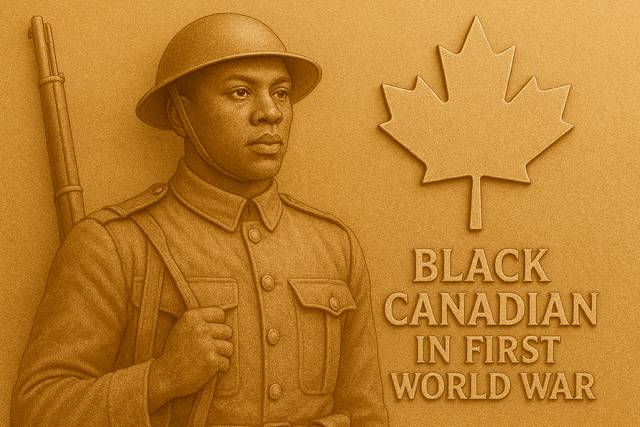Black Canadians and Conscription in the First World War

Title: Black Canadians and Conscription in the First World War
Source: The Canadian Encyclopedia Article by Mathias Joost | Published Online: February 17, 2022
Overview: In 1917, Canada passed the Military Service Act, making conscription mandatory for all male citizens aged 20 to 45. Though Black Canadians had faced opposition when trying to enlist earlier in the First World War (1914–18), they were not exempt from this law. At least 350 Black Canadians were conscripted, with the majority serving in the Canadian Forestry Corps (CFC) and some on the front lines.
Identifying Black Soldiers: Ethnicity was not recorded in the Canadian Militia’s records, making it difficult to determine how many Black Canadians served. Researchers have compared census data with military records to identify servicemen. Therefore, the known number of Black Canadian conscripts is considered conservative.
Conscription in Canada:
-
Initially, Canada relied on volunteers, but declining enlistment led to conscription.
-
The Military Service Act (29 August 1917) required all eligible males to register.
-
By the end of 1917, 400,000 had registered, but most applied for exemptions.
-
Around 125,000 were called up; 48,000 went overseas; over 24,000 served in France.
Black Canadians:
-
Faced racial barriers to volunteering but were still subject to conscription.
-
Some resisted registration due to the racism they had previously experienced.
-
At least 358 Black Canadians were conscripted; around 220 sent overseas; 12% saw frontline service.
-
Black conscripts were often rated as Category C (non-combat roles) or discharged for medical or citizenship reasons.
Service in the Canadian Forestry Corps:
-
Many Black conscripts sent to the CFC Depot instead of combat training.
-
Policy in England discouraged their integration into reserve battalions.
-
CFC later supported Royal Air Force (RAF) operations in Belgium and France.
-
No. 8 Company included 169 Black soldiers out of 180; 15% of No. 7 Company were Black.
Frontline Service:
-
Only 28 Black conscripts saw frontline duty.
-
First was Private Joseph Malott (March 1918).
-
Most served during the Hundred Days Campaign (Aug-Nov 1918).
-
Dispersed across several battalions.
-
3 were killed, and 9 were wounded.
-
Notable cases: Jenkins, Hesson (wounded), Hosey (killed).
Significance: Despite racism and limited roles, Black Canadians fulfilled their duty during WWI. They reinforced depleted Canadian divisions during critical final battles. Their service, particularly during the Hundred Days Campaign, contributed to the Allied victory. These contributions are remembered alongside the 66,000 Canadians and Newfoundlanders who lost their lives in the war.